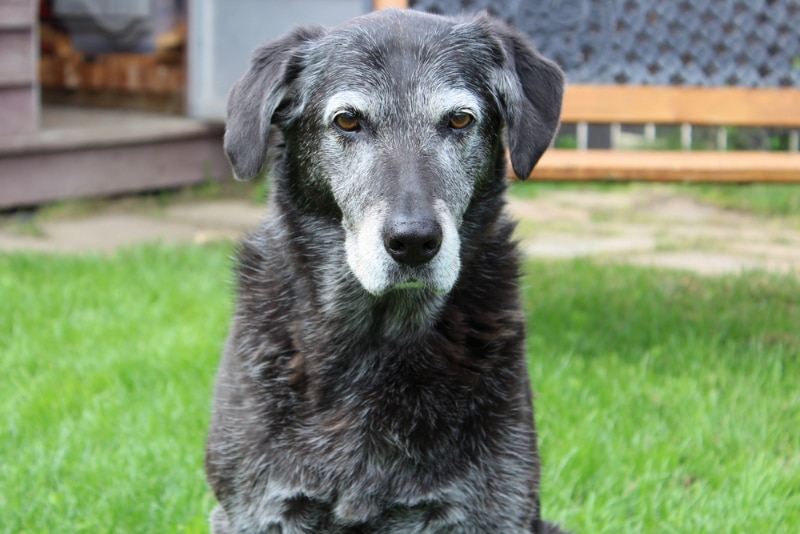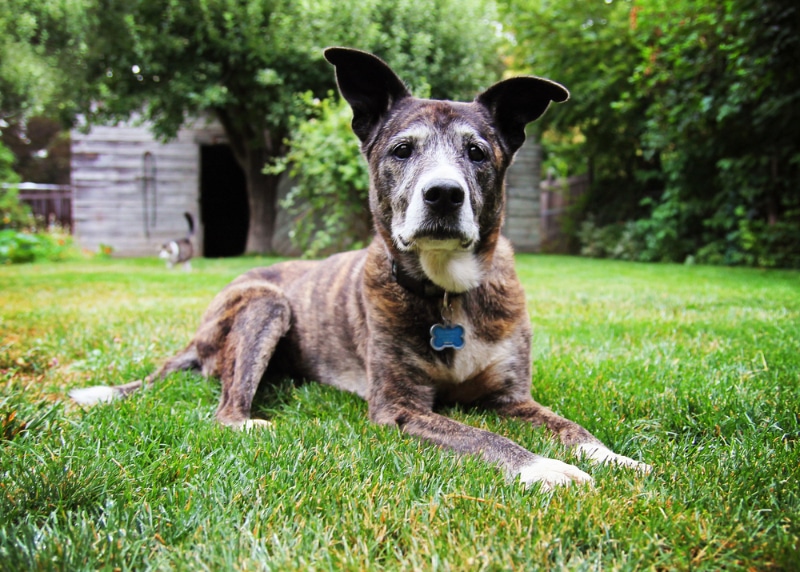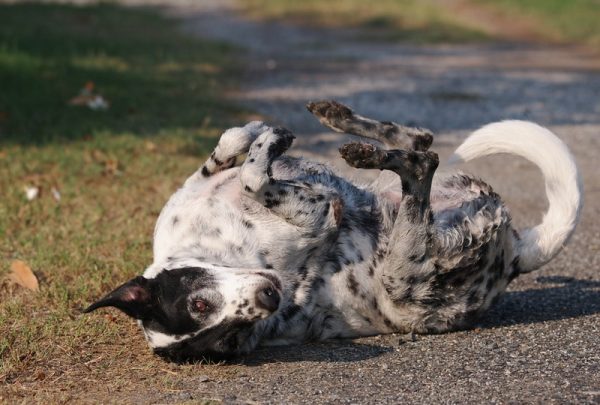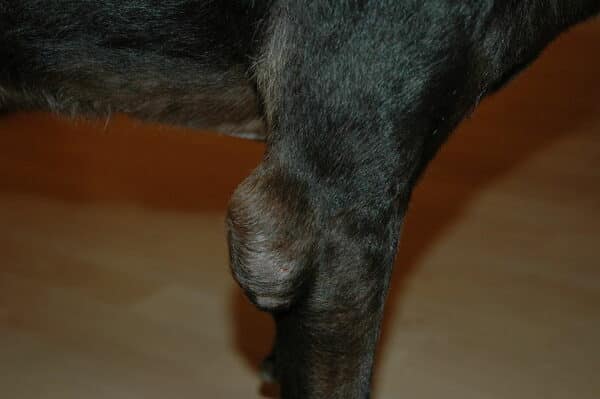As our dogs mature and enter their senior years, we commonly recognize behavior changes. For some, it may be that their dog wanders and appears lost at times. Or maybe your companion appears restless in the evenings, unable to settle. These behavior changes may be suggestive of sundowners, or doggie dementia. Continue reading to learn more about this condition and how we can support our canine companions as they age.

What Is Sundowners?
“Sundowners” is a term used to describe people with dementia who experience an onset of signs late in the day, as the sun goes down. This term has been modified to describe our canine companions that show signs of confusion or unusual behavior suggestive of cognitive dysfunction. Other terms for this condition are cognitive dysfunction syndrome and doggie dementia.
This type of brain deterioration can be seen in dogs 9 years and older. One study suggested that 68% of dog owners reported signs of dementia in their dogs between the ages of 15–16 years.1

What Are the Signs of Sundowners?
Signs of cognitive dysfunction syndrome can vary amongst patients and may be difficult to identify in some.
Signs supportive of cognitive dysfunction syndrome are abbreviated as DISHA.
- Disorientation
- Interaction changes
- Sleep/wake cycle changes
- House soiling
- Activity level changes
What Are the Causes of Sundowners?
The underlying cause of sundowners or cognitive dysfunction syndrome correlates to the deterioration of the brain due to aging. Other conditions, including hearing impairment, blindness, and pain, may resemble sundowners, as patients may behave similarly.

Diagnosing Sundowners or Cognitive Dysfunction Syndrome
Other disease processes can have similar signs as cognitive dysfunction syndrome. If cognitive decline is suspected in your pet, a veterinarian will perform a full physical examination and run baseline lab work. Cognitive dysfunction syndrome is more of a diagnosis of exclusion, as there is not a specific test available.
Advanced imaging like an MRI can be done to check for atrophy of the brain. MRIs can also be a way of ruling out other causes of behavior changes, like brain tumors.
How Do I Care for a Dog With Sundowners?
Unfortunately, there is not a specific “cure” for cognitive dysfunction syndrome. The main focus of care is to slow the progression of brain degeneration. However, one of the best things you can do at home is to keep them calm and relaxed. This can include things like offering their own quiet room in the house, playing calming music, avoiding bright lights, keeping their surroundings familiar and safe, and sticking to a regular exercise routine. With that said, care can also include the following, which you should speak to a vet about.
Did you know you can speak to a veterinarian without having to travel? Just head over to PangoVet. It's our online service where you can talk to a vet online and get the advice you need for your pet — all at an affordable price!

1. Medications/Supplements
Selegiline is a monoamine oxidase B inhibitor that is available in the United States to reduce signs of cognitive decline in dogs. Selegiline may also increase dopamine. Over 70% of pet owners who administered Selegiline to their dogs reported an improvement in clinical signs within 1 month.2
S-adenosylmethionine (SAMe) can also improve signs of cognitive dysfunction in affected dogs. SAMe is considered a nutritional supplement.
Although not yet utilized in the United States, certain medications that increase cerebral perfusion are being used in European countries to combat different signs of cognitive dysfunction syndrome.
2. Modifications to Routines
It is important to create a safe environment for your pet to be in. If you are away from them, it may be helpful to confine them into a space where they are unable to explore or potentially get lost or stuck.
If your senior pup has suddenly forgotten their housetraining, it will be important to offer more bathroom breaks throughout the day.
Remember, patience is key when caring for a pet suffering from sundowners or cognitive dysfunction syndrome.

3. Diets
Some diets are available that have high levels of antioxidants, essential fatty acids, and other nutrients that are beneficial to the brain. A veterinarian will be able to help guide your diet selection, as some are prescription diets, whereas others are over-the-counter.
4. Enrichment
Mental stimulation will help slow cognitive dysfunction syndrome in dogs. This can be in the form of exercise, play, and training. Food puzzles can be great forms of mental stimulation for senior dogs. Alternatively, you could consider teaching your pet a new trick that doesn’t require significant physical strain.
5. Thunder Shirts
Thunder shirts are often used with dogs that suffer from noise phobias and other forms of anxiety, and they may even help dogs with sundowners.
6. Night Light
Use a night light – most older dogs develop nuclear sclerosis (aka lenticular sclerosis), which is a normal sign of aging. The opacity of the lens in the eye increases over time, gradually reducing the amount of light that can reach the back of the eye. This can significantly impact your dog’s night vision, which can be very stressful for your older dog. Leaving just a dim light on at night can make a huge difference.

FAQ (Frequently Asked Questions)
Can I Slow the Cognitive Decline in My Dog?
Fortunately, treatments used in dogs with signs of dementia can slow the progression of cognitive dysfunction. Unfortunately, this is a progressive condition that cannot be reversed or cured.
Are Some Dogs More Predisposed to Cognitive Dysfunction Than Others?
Dogs older than 9 are more likely to develop cognitive dysfunction syndrome. Labrador Retrievers, Staffordshire Terriers, and Cocker Spaniels are among some of the more predisposed breeds. Additionally, spayed females seem to be the most at risk.


Conclusion
Aging in our pets is not something that can be avoided. Unfortunately, some signs of cognitive dysfunction syndrome may be mistaken for normal aging progression, and intervention may not be immediately pursued.
Cognitive dysfunction syndrome is a progressive disorder and one that cannot be cured. Different modalities can be utilized that may be able to slow the progression of decline and improve clinical signs. If you start noticing changes in your pet, it is a good idea to schedule a consultation with a veterinarian who can perform an evaluation and offer personalized recommendations to benefit your pet.
Featured Image Credit: Tanya_Terekhina, Shutterstock




















